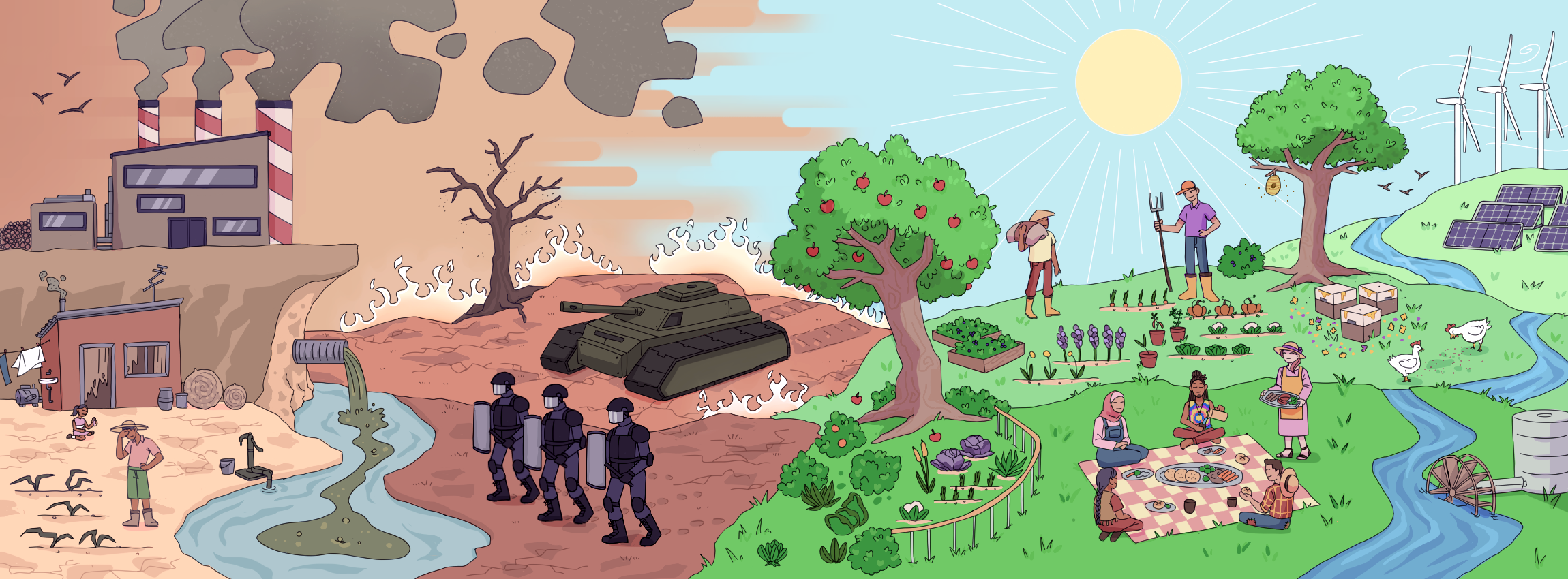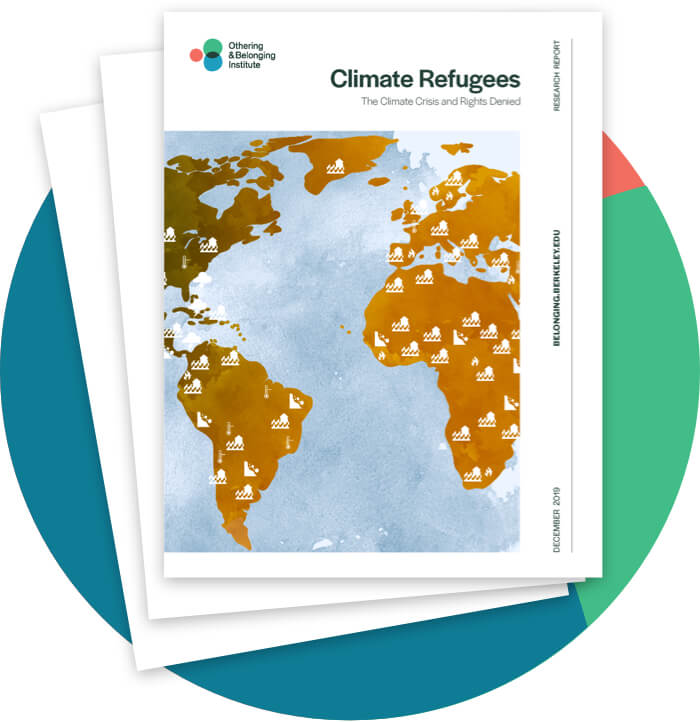Egypt
Egypt: A Brief Introduction
Egypt is the most populous country in the Arab world and the third most populous country in Africa.1 It has a population of 109.26 million people,2 57 percent of which is rural.3 Egypt is dry, hot, and dominated by desert.4 The country is extremely arid and receives little annual precipitation.5 Egypt’s primary challenges related to the climate crisis are its rapidly growing population, limited arable land, lack of water availability, and changing precipitation patterns – all of which induce demands upon resources.5 Egypt is home to the Nile Delta, which is recognized as one of the world’s three “extreme” vulnerability hotspots.6 More than half of Egypt’s crops are grown along the Nile River Delta,7 which makes the area’s vulnerability especially alarming and also means that the majority of the country’s population – 90 percent of which lives in the Nile Basin and 50 percent of which lives in the delta itself – will likely experience upheaval due to the climate crisis.8 Since the 2013 military coup d’état in which President Abdel Fattah al-Sisi took power, Egypt’s increasingly authoritarian government has attempted to erode its environmental civil society. This dictatorship threatens human rights and also impedes the country’s capacity to follow through on its climate goals and commitments.
Mapping Major Climate Events and Climate-Induced Displacement
On the ND-GAIN Index, Egypt ranked 107th out of 181 countries in 2020.9 This high risk and low resilience can largely be attributed to the country’s dependence on the Nile River, which serves multiple needs – including potable water, agriculture, industry, fish farming, power generation, inland river navigation, mining, oil and gas exploration, cooling of machinery, and power generation10 – and is drying up.11 The Nile provides over 95 percent of the country’s water, making Egypt particularly vulnerable to rising temperatures, reduced rainfall for the upper Nile Basin, and decreasing rainfall on the east Mediterranean coastal zone.12 Over the last 20 years, climate hazards have killed close to 1,500 people in Egypt, resulting in an estimated $346.7 million worth of damages.12 In 2009, the Duweika rockslide buried an informal settlement south of Cairo, severely damaging infrastructure and causing significant loss of life.13 In 2010, heavy flooding in the southern governorate Aswan displaced thousands of people and over 4,000 houses were damaged or completely destroyed.14 Densely populated coastlines in North Africa are among the world’s areas most threatened by rising sea levels; for Egypt, this means that internally displaced people and those from other countries in the region are likely to migrate to big cities such as the capital city, Cairo. However, even these “hotbeds of climate migration” are themselves at risk due to rising waters.10 In Alexandria, on the northern Mediterranean coast, if the sea level rises by half a meter, it is estimated that two million people – approximately one third of the city’s population – could be displaced and 214,000 jobs could be lost.15 Due to disasters, there was an estimated total of 1,100 internal displaced people in Egypt at the end of 2021.16
Mapping the Costs of the Climate Crisis
The GDP of Egypt is $404.14 billion,17 of which the services sector comprises 54 percent, industry comprises 34.3 percent, and agriculture comprises 11.7 percent.18 Due to the climate crisis, researchers predict that Egypt could lose half of the productivity of its agricultural sector by 2060.19 Climate change impacts threaten the country’s long-term economic growth, with the number of people living on less than $4 a day expected to increase by more than 9 million (0.8 percent) by the end of 2030.20 Egypt is predicted to face the consequences of rising sea levels, water scarcity, and an increase in the frequency and intensity of extreme weather events such as heat waves, sand and dust storms, flash floods, rock slides, and heavy rains.10 With a projected hotter and drier climate – and its subsequent increased frequency and severity of droughts – makes Egypt more susceptible to continue to be impacted by droughts, which, along with the country’s dependence on the Nile, will exacerbate existing water deficits.21 The climate crisis is also worsening centuries of destructive human impact on treasured monuments and the preservation of the cultural heritage of Ancient Egypt, one of the cradles of civilization.11
Mapping Resilience and Mitigation Pathways
Egypt’s National Climate Change Strategy 2050 and updated National Determined Contributions are important steps for climate policy, as they prioritize mitigation and adaptation by enabling goals on regulations, financing, technology, and capacity.22 Specifically, the June 2022 NDCs include emissions reductions targets of mitigating 33 percent of emissions from the electricity sector, 65 percent from the associated gases subsector of the oil and gas sector, and 7 percent of emissions from the transportation sector by 2030.23 In addition to goal-setting, Egypt has already made strides in climate action, through increasing its wind energy capacity fivefold, constructing desalination plants, bolstering flood-prevention infrastructure, and issuing green bonds to direct $750 million toward clean public transportation and water management.24 In building resilience, Egypt prioritizes mitigation pathways that simultaneously advance both its climate and sustainable development goals. The pilot “Housing For All” green building program demonstrates the country’s commitment to providing affordable housing to 1 million low-income households while also seeking to reduce energy consumption by 24 to 50 percent.25
Necessary Changes
The World Bank Group suggests the following actions to align Egypt’s climate objectives with its sustainable development ones: 1. using and allocating natural resources more efficiently; 2. building stronger information systems that share climate information to better and more quickly adapt to and prepare for weather events (the cost-benefit ratio of which is estimated to be $9 of potential losses averted for every $1 spent on strengthening information systems); 3. prioritizing emissions reductions in the transport, energy and industry sectors; and 4. ensuring full implementation of Egypt’s Electricity and Renewable Energy Laws.20 Through sharing resources and investing in renewable energy projects, the international community can help Egypt continue to leverage its abundance of land, sunny weather, and high wind speeds in its just transition trajectory.26
Critically, however, and as highlighted during Egypt’s hosting of COP27, environmental groups in Egypt have long been unable to fulfill their “watchdog” role against abuses of governmental power because of the severe retaliation they would likely face if they were to call out the government’s failure to protect Egyptians’ rights against damage caused by corporate interests, such as issues relating to “water security, industrial pollution, and environmental harm from real estate, tourism development, and agribusiness.”27 This government curtailment of independent environmental groups’ ability to carry out policy, advocacy, and field work not only violates rights to freedom of assembly and association, but also threatens the country’s ability to uphold its climate commitments.27 If Egypt truly wants to demonstrate global leadership on climate action and augment its preparation for resilience in the face of its considerable vulnerability to climate devastation,28 then its work on such strategies must also entail the lifting of repressive laws and onerous restrictions targeting local environmental organizations and, instead, prioritize these groups’ importance and expertise in the climate justice movement.29
Citations
- 1“The World Factbook: Egypt,” CIA, accessed March 14, 2023, https://www.cia.gov/the-world-factbook/countries/egypt.
- 2“Population, total – Egypt,” The World Bank Group, accessed March 14, 2023, https://data.worldbank.org/indicator/SP.POP.TOTL?end=2017&locations=EG&…;
- 3“Rural population (% of total population) – Egypt,” The World Bank Group, accessed March 14, 2023, https://data.worldbank.org/indicator/SP.RUR.TOTL.ZS?end=2017&locations=….
- 4“Climate Change Knowledge Portal – Egypt,” The World Bank Group, accessed March 14, 2023, https://climateknowledgeportal.worldbank.org/country/egypt/climate-data….
- 5 a b Ibid (i).
- 6National Adaptation Plans in Focus: Lessons from Egypt (UNDP-UN Environment National Adaptation Plan Global Support Programme, 2018), accessed March 14, 2023, https://www.adaptation-undp.org/sites/default/files/resources/naps_in_f….
- 7Jane Arraf, “In Egypt, A Rising Sea – and Growing Worries about Climate Change's Effects,” NPR, August 13, 2017, https://www.npr.org/sections/parallels/2017/08/13/542645647/in-egypt-a-….
- 8Christian Haars, Bram Winkelaar, Emma Maria Lönsjö, and Bianca Mogos, “The Uncertain Future of the Nile Delta,” ResearchGate, April 2016, https://www.researchgate.net/figure/The-population-density-in-Egypt-cen….
- 9“2020 ND-GAIN Country Index,” Notre Dame Global Adaptation Initiative, accessed March 14, 2023, https://gain.nd.edu/our-work/country-index/rankings.
- 10 a b c Climate Risk Country Profile: Egypt (Washington, DC: The World Bank Group, 2021), accessed March 14, 2023, https://climateknowledgeportal.worldbank.org/sites/default/files/2021-0….
- 11 a b Vivian Yee, “Climate Change and Human Activity Erode Egypt’s Treasured Antiquities,” The New York Times, November 15, 2022, https://www.nytimes.com/2022/11/12/world/middleeast/climate-change-and-….
- 12 a b Ibid (ii).
- 13“City Officials Convicted Over Deadly Cairo Rockslide,” Amnesty International, May 28, 2010, https://www.amnesty.org/en/latest/news/2010/05/head.
- 14“Thousands of Aswan Flood Victims Still Awaiting Compensation,” The New Humanitarian, June 29, 2010, https://www.thenewhumanitarian.org/news/2010/06/29/thousands-aswan-floo….
- 15“Millions at Risk of Climate Displacement in Middle East,” Radio France Internationale, October 30, 2022, https://www.rfi.fr/en/middle-east/20221030-millions-at-risk-of-climate-….
- 16“Country Profile – Egypt,” Internal Displacement Monitoring Centre, accessed March 14, 2023, https://www.internal-displacement.org/countries/egypt.
- 17“GDP (current US$) – Egypt,” The World Bank Group, accessed March 14, 2023, https://data.worldbank.org/indicator/NY.GDP.MKTP.CD?locations=EG&most_r….
- 18“Egypt: Introduction,” MSU Broad College of Business International Business Center, accessed March 14, 2023, https://globaledge.msu.edu/countries/egypt.
- 19“Climate Change Could Displace Millions from Middle East Region: Report,” Egypt Independent, October 31, 2022, https://egyptindependent.com/climate-change-could-displace-millions-fro….
- 20 a b “Egypt: Climate Action Can Strengthen Long-Term Growth,” The World Bank Group, November 8, 2022, https://www.worldbank.org/en/news/press-release/2022/11/08/world-bank-c….
- 21Ibid (iii)
- 22Country Climate and Development Report: Egypt (Washington, DC: The World Bank Group, 2022), accessed March 14, 2023, https://documents1.worldbank.org/curated/en/099510011012235419/pdf/P177….
- 23Ibid (iv).
- 24Kali Robinson, “Egypt Is Hosting COP27. Can It Become Africa’s Climate Champion?,” Council on Foreign Relations, September 8, 2022, https://www.cfr.org/in-brief/egypt-hosting-cop27-can-it-become-africas-….
- 25“Egypt’s Green Social Housing Supports Climate Efforts and Improves Quality of Life for Citizens,” The World Bank Group, September 28, 2022, https://www.worldbank.org/en/news/feature/2022/09/21/egypt-s-green-soci….
- 26Hala Abou-Ali, Amira El-Ayouti, and Mahmoud Mohieldin, “Climate Action in Egypt: Challenges and Opportunities, The Brookings Institution, February 16, 2023, https://www.brookings.edu/research/climate-action-in-egypt-challenges-a….
- 27 a b Ibid (v).
- 28Mohammed Soliman, “At COP27, Egypt Aims to Rebuild its International Standing,” Carnegie Endowment for International Peace, October 26, 2022, https://carnegieendowment.org/2022/10/26/at-cop27-egypt-aims-to-rebuild….
- 29“Egypt: Government Undermining Environmental Groups – COP27 Countries Should Press Cairo to End Restrictions, Enable Participation,” Human Rights Watch, September 12, 2022, https://www.hrw.org/news/2022/09/12/egypt-government-undermining-enviro….


